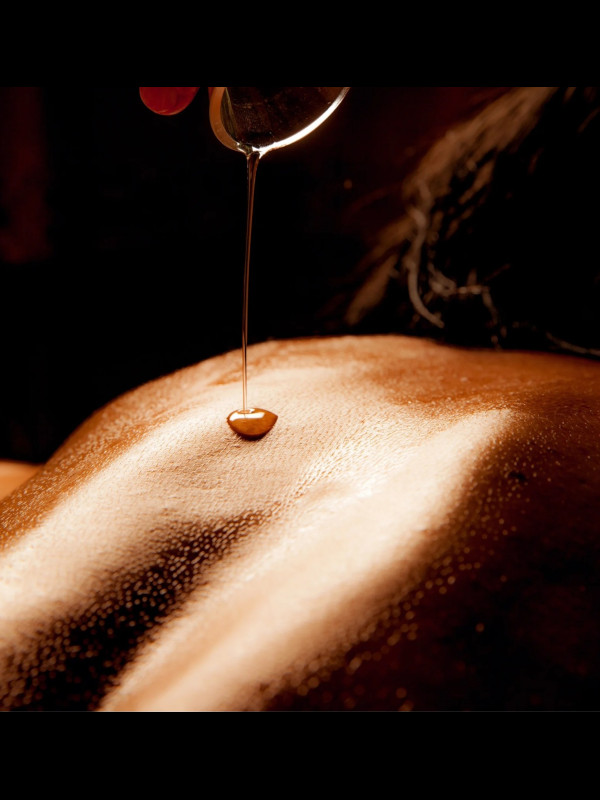A Brief History of Japanese Erotic Massage
The Pillow Book, a collection of ancestral hereditary advice intended for the good wife of medieval Japan, elevates erotic massage to the rank of domestic art, praising its virtues in maintaining a man’s balance and the harmony between his body and mind.
Nuru massage, on the other hand, appeared in the 1970s in the city of Kawasaki. The word "Nuru" means "slippery" in Japanese. Initially reserved for Japanese spas, it quickly spread and is now sought after worldwide for its intensity and originality.
Nuru massage is said to have been born by happy accident. Japanese practitioners discovered that Nori seaweed, used to prepare the massage gel, had moisturizing effects and a slippery texture ideal for body-to-body contact. This innovation helped eliminate friction and made the experience both smooth and stimulating. The technique became so popular that it quickly crossed Japan’s borders, often carried by travelers fascinated by this unique form of massage.
The Benefits of Nuru Massage
Nuru massage is much more than just an erotic experience; it provides physical, emotional, and psychological benefits that make it a popular wellness practice. Its effects lie in the "body-to-body" technique combined with the use of Nuru gel, a natural substance made from Nori seaweed. Here are some of the key benefits of this unique massage.
Deep Relaxation and Stress Relief
Nuru massage induces intense muscle relaxation through the warmth and even pressure of the practitioner’s body against that of the receiver. This prolonged and fluid contact helps reduce muscle tension, releases blockages in the body, and promotes blood circulation. By stimulating oxygen flow to the tissues, it also contributes to quick stress relief. The smooth movements and the soothing feel of the Nuru gel create an immediate and deep state of well-being, helping to ease accumulated stress.
Improved Skin Quality
Nuru gel is known for its moisturizing properties, thanks to the Nori seaweed, which is rich in vitamins, minerals, and antioxidants. When applied to the body, Nuru massage deeply nourishes and revitalizes the skin, leaving it soft and refreshed after the session. The gentle and gliding movements also help remove dead skin cells, enhancing the skin’s glow and elasticity.
Sensory Awakening and Emotional Well-Being
Nuru massage creates an enveloping sensory experience, ideal for those looking to reconnect with their body and sensations. The body-to-body contact can enhance body awareness, improve self-image, and encourage acceptance of one’s own body. The experience can also trigger the release of endorphins, promoting lasting feelings of well-being. Additionally, the massage’s gentle and respectful approach allows emotional release, calming the mind and supporting emotional letting go.
Japanese Body-to-Body Massage
Just like the Thai body-to-body massage, Nuru massage is a Japanese body-to-body massage. Both are rituals rooted in the Asian tradition of massage, wellness, and harmony between body and mind — a concept not so foreign to some of our own heritages from Ancient Greece, such as hedonism and epicureanism.
This massage is distinguished by its original body-to-body technique, where the nude masseuse uses her entire body to glide over the client’s, creating a unique and highly sensual experience.
Nuru’s influence has reached pop culture and the media. TV shows and films have referenced this Japanese practice, sparking even more curiosity. Often misunderstood and surrounded by mystery, this massage has become a fascination for many people seeking alternative forms of relaxation.
The Cultural and Symbolic Aspects of Nuru Massage
Nuru massage finds its roots in Japanese tradition, where respect for the body and harmony with nature play a central role. In Japanese culture, wellness practices are often infused with symbolism related to balance, energy, and reconnection with the body. Nuru, with its seaweed-based gel and body-to-body approach, is in many ways an extension of this philosophy, aiming to create a symbiosis between masseuse and recipient.
The use of Nori seaweed — natural and rich in minerals — represents a connection to the sea, a symbolic source of life and purification in Japanese culture. This practice also emphasizes humility and respect for the human body, both for the one receiving the massage and the masseuse, highlighting the emotional and sensory bond rather than the mere technique.




